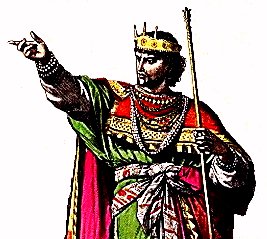
Rehoboam
For three years Rehoboam tried to profit by his sad experience at the beginning of his reign; and in this effort he was prospered. He "built cities for defense in Judah," and "fortified the strongholds, and put captains in them, and store of victual, and of oil and wine." He was careful to make these fortified cities "exceeding strong." 2 Chronicles 11:5, 11, 12. But the secret of Judah's prosperity during the first years of Rehoboam's reign lay not in these measures. It was their recognition of God as the Supreme Ruler that placed the tribes of Judah and Benjamin on vantage ground. To their number were added many God-fearing men from the northern tribes. "Out of all the tribes of Israel," the record reads, "such as set their hearts to seek the Lord God of Israel came to Jerusalem, to sacrifice unto the Lord God of their fathers. So they strengthened the kingdom of Judah, and made Rehoboam the son of Solomon strong, three years: for three years they walked in the way of David and Solomon." Verses 16, 17.
In continuing this course lay Rehoboam's opportunity to redeem in large measure the mistakes of the past and to restore confidence in his ability to rule with discretion. But the pen of inspiration has traced the sad record of Solomon's successor as one who failed to exert a strong influence for loyalty to Jehovah. Naturally headstrong, confident, self-willed, and inclined to idolatry, nevertheless, had he placed his trust wholly in God, he would have developed strength of character, steadfast faith, and submission to the divine requirements. But as time passed, the king put his trust in the power of position and in the strongholds he had fortified. Little by little he gave way to inherited weakness, until he threw his influence wholly on the side of idolatry. "It came to pass, when Rehoboam had established the kingdom, and had strengthened himself, he forsook the law of the Lord, and all Israel with him." 2 Chronicles 12:1.
How sad, how filled with significance, the words, "And all Israel with him"! The people whom God had chosen to stand as a light to the surrounding nations were turning from their Source of strength and seeking to become like the nations about them. As with Solomon, so with Rehoboam--the influence of wrong example led many astray. And as with them, so to a greater or less degree is it today with everyone who gives himself up to work evil--the influence of wrongdoing is not confined to the doer. No man liveth unto himself. None perish alone in their iniquity. Every life is a light that brightens and cheers the pathway of others, or a dark and desolating influence that tends toward despair and ruin. We lead others either upward to happiness and immortal life, or downward to sorrow and eternal death. And if by our deeds we strengthen or force into activity the evil powers of those around us, we share their sin.
God did not allow the apostasy of Judah's ruler to remain unpunished. "In the fifth year of King Rehoboam Shishak king of Egypt came up against Jerusalem, because they had transgressed against the Lord, with twelve hundred chariots, and three score thousand horsemen: and the people were without number that came with him out of Egypt. . . . And he took the fenced cities which pertained to Judah, and came to Jerusalem.
"Then came Shemaiah the prophet to Rehoboam, and to the princes of Judah, that were gathered together to Jerusalem because of Shishak, and said unto them, Thus saith the Lord, Ye have forsaken Me, and therefore have I also left you in the hand of Shishak." Verses 2-5.
The people had not yet gone to such lengths in apostasy that they despised the judgments of God. In the losses sustained by the invasion of Shishak, they recognized the hand of God and for a time humbled themselves. "The Lord is righteous," they acknowledged.
"And when the Lord saw that they humbled themselves, the word of the Lord came to Shemaiah, saying, They have humbled themselves; therefore I will not destroy them, but I will grant them some deliverance; and My wrath shall not be poured out upon Jerusalem by the hand of Shishak. Nevertheless they shall be his servants; that they may know My service, and the service of the kingdoms of the countries.
"So Shishak king of Egypt came up against Jerusalem, and took away the treasures of the house of the Lord, and the treasures of the king's house; he took all: he carried away also the shields of gold which Solomon had made. Instead of which King Rehoboam made shields of brass, and committed them to the hands of the chief of the guard, that kept the entrance of the king's house. . . . And when he humbled himself, the wrath of the Lord turned from him, that He would not destroy him altogether: and also in Judah things went well." Verses 6-12.
But as the hand of affliction was removed, and the nation prospered once more, many forgot their fears and turned again to idolatry. Among these was King Rehoboam himself. Though humbled by the calamity that had befallen him, he failed to make this experience a decisive turning point in his life. Forgetting the lesson that God had endeavored to teach him, he relapsed into the sins that had brought judgments on the nation. After a few inglorious years, during which the king "did evil, because he prepared not his heart to seek the Lord," "Rehoboam slept with his fathers, and was buried in the City of David: and Abijah his son reigned in his stead." Verses 14, 16.
PK 92- 95
